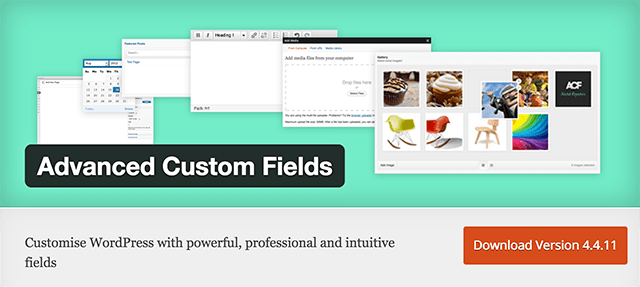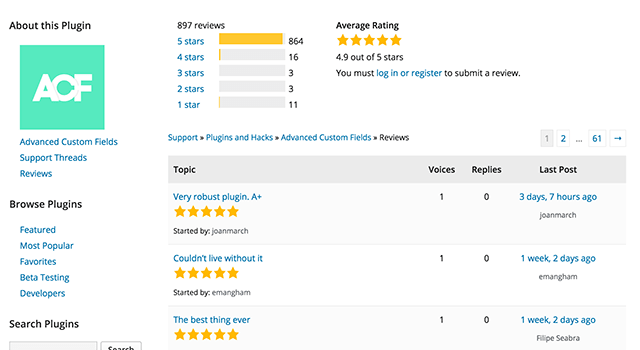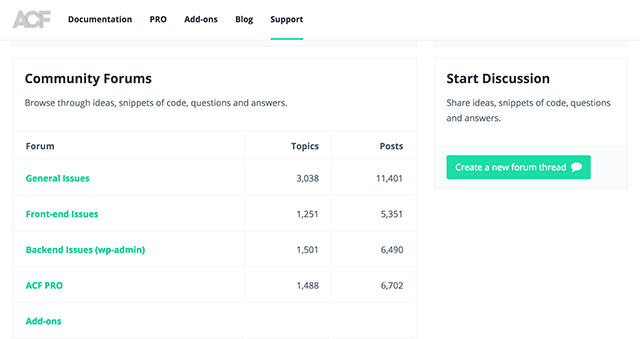Advanced Custom Fields (ACF) is an immensely popular plugin that’s been embraced by WordPress developers worldwide, and it’s been a consistently trending plugin on GoDaddy’s WordPress Hot 100 throughout the year.
For those unfamiliar with the plugin, here’s the gist: Advanced Custom Fields allows developers to build custom editor interfaces for handling user input. The collected data can then be manipulated in themes and plugins using ACF’s well-documented API.

During my time as a WordPress developer, our team would use Advanced Custom Fields in every site we built: our page layouts would be handled by a custom theme, and the theme would call the required fields from ACF. This way we never had to worry about a non-technical end user breaking the layout — they just had to enter their content into the proper fields.
Building this sort of functionality for every client project would add a beastly amount of overhead in terms of time and budget. Yet with ACF we have a plugin that’s been made available, absolutely free, so we don’t need to worry about it.
I got in touch with Elliot Condon, the Melbourne-based developer of Advanced Custom Fields, to learn why and how this plugin came to exist.
Why did you create Advanced Custom Fields?
I created ACF to help myself better make websites when freelancing. A few custom field plugins existed at the time. However, they lacked a professional finish that I wanted for my clients.
My motivation was to create a professional looking custom field UI for both myself and my clients to use.
What impact has ACF had on your freelancing business?
It’s resulted in a 100-percent change to my work. I no longer take on any freelance work and dedicate my focus full time to ACF.
Which features in ACF are you proud of building?
The repeater field was the first “premium feature” I created and is still the most rewarding to use. That said, I’m proud of each version’s new features and improvements. I’m always trying to optimise, simplify and improve the core code whilst adding in new features, so each new version is better than the last!
Are there any interesting things you’ve seen done with ACF?
I’m always impressed to hear the creative ways that ACF is used. Because it is simply a UI layer for storing custom fields, there is no limitation for what it can be used for. The most typical use for ACF is to better manage a website’s content, but ACF can also be used to create web applications, contact forms, and anything else that requires a way to edit data.
Many WP developers rely on ACF for site builds. What’s that experience been like for you, to watch that evolution and growth?
It has been amazing.
I’m still surprised and humbled every day reading emails and working on ACF.
The growth has been both organic and steady, which has allowed me to work at a rewarding rate where I can learn, improve and create.
In regards to learning and improving, what has your attention right now?
I believe a large part of WordPress’s success is due to its prioritization of compatibility. WordPress tries above all else to avoid making breaking changes. It uses simple PHP and JavaScript to stay compatible across many different servers and browsers. I’ve adopted a similar approach, and don’t rely on any cutting-edge tech. This allows me to focus on writing smarter code.
What’s your guiding philosophy around product development?
I’m definitely one for quality and I think this has been the key to ACF’s success. I will admit that ACF doesn’t have the fastest release cycle and many features take longer to adopt than they should. However, by focusing on quality control, I can stay confident that my customers are using a reliable product. In return, a reliable product creates trust, which results in more word of mouth and more sales.

How has your quality assurance process evolved over the years?
Nothing major has changed. However, I do set aside more time for testing and have a much more thorough workflow for development/testing/release.
What keeps you motivated to keep working on ACF?
New challenges. Each new feature is a challenge that is super-rewarding to complete. Also, ACF is my developer playground where I can redesign, recode and improve functions, classes, ideas and approaches. Having the ability to go back and improve is a huge motivator that not all projects allow.
How do you handle support?
I handle support on a few fronts. The main support channel is an email ticket system. This is followed up by a community-driven support forum. Finally, there are always a few direct emails that make their way to my inbox! I can’t handle the support traffic on my own, so I hire some talented devs across the world to help.

What’s your approach to hiring developers and building a remote team?
I do have a local support team which helps with the email tickets, but when it comes to product development, it’s just me at my laptop.
I’m a one-man team.
(This might be changing in 2017 with the potential of hiring, so perhaps I’ll report back then.)
What have you learned from growing ACF as a business?
Growing ACF as a business has been one of the best things I’ve ever done. The knowledge and experience is something that can’t be taught but something that everyone should have.
When you are able to help millions of developers across the globe, it’s hard to see anything as impossible.
What advice do you have for other plugin developers who see this as a business opportunity?
My only advice is to stop thinking and start doing. Working with the WordPress community is super-rewarding!
Thanks to Elliot Condon for working with us on this article. You can download Advanced Custom Fields for free from the WordPress plugin directory, and upgrade to Pro via the ACF website. If you’d like to connect with Elliot, you can find him on Twitter.





